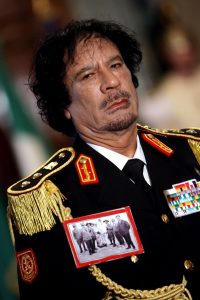
In the annals of African history, few figures stand as prominently as the enigmatic and controversial Colonel Muammar Gaddafi, often referred to as Mamar Gaddafi. His legacy is a cocktail of triumphs and controversies that have left an indelible mark on not just Libya but the entire African continent. In this piece, we look into this charismatic leader’s life, accomplishments, and impact, aiming to provide a well-rounded perspective that will help you better understand the man behind the legend.
Early Life and Rise to Power
Born on June 7, 1942, in a small desert town called Sirte, in what is now known as Libya, Muammar Gaddafi came from modest beginnings. His childhood was marked by the simple life of a Bedouin shepherd, which instilled in him a deep connection to his country’s land and traditions.
In 1969, a young and determined Gaddafi led a group of military officers in a coup that ousted King Idris I from power. This event marked the beginning of Gaddafi’s rule and the establishment of the Libyan Arab Republic. His vision was clear: to create a state that would prioritize the interests of the Libyan people above all else.
The Gaddafi Era
Colonel Gaddafi was not your conventional leader. He introduced the world to his ideology known as the “Third International Theory.” This theory aimed to strike a balance between capitalism and communism, advocating for a system of direct democracy through people’s committees. Though it faced criticism and skepticism, this concept was instrumental in shaping Libya’s domestic policies.
Under Gaddafi’s rule, Libya experienced significant changes in wealth distribution. The nation’s oil wealth, previously controlled by foreign entities, was nationalized. The revenue from oil exports was used to improve the lives of ordinary Libyans. Free healthcare, education, and subsidized housing became the norm.
Pan-Africanism and Gaddafi’s Global Impact
Beyond his domestic policies, Colonel Gaddafi was a fervent advocate for Pan-Africanism. He believed in the unification of African nations as a means to counteract the influence of Western powers. Gaddafi played a pivotal role in the establishment of the African Union (AU), which aimed to promote unity, peace, and development across the continent.
Gaddafi was often called upon to mediate in various African conflicts. His interventions in Chad, Uganda, and Sudan were lauded for their efforts to bring about peaceful resolutions. His commitment to diplomacy earned him respect as a leader who sought to bridge divides and promote African solidarity.
The Controversies Surrounding Gaddafi
While Gaddafi’s leadership had its share of accomplishments, it was also marred by allegations of authoritarianism and human rights abuses. His regime faced accusations of suppressing dissent, limiting political freedoms, and silencing opposition voices.
Gaddafi’s foreign policy choices led to Libya’s isolation on the global stage. His support for terrorist organizations, such as the Irish Republican Army (IRA) and the Palestine Liberation Organization (PLO), strained relations with Western nations. This culminated in the United Nations sanctions imposed on Libya in the late 1990s.
The Arab Spring and Libyan Revolution
In 2011, amidst the wave of Arab Spring uprisings, Libya witnessed a revolution that aimed to topple Gaddafi’s regime. The conflict escalated into a full-blown civil war, with NATO intervening on the side of the rebels. After months of intense fighting, Gaddafi’s rule came to a dramatic and violent end.
The legacy of Muammar Gaddafi continues to be a subject of debate. While some view him as a visionary leader who transformed Libya and championed Pan-Africanism, others remember the controversies and authoritarianism that marked his rule. The aftermath of his downfall has left Libya grappling with instability and ongoing conflicts.
Conclusion
In retrospect, the life and reign of Muammar Gaddafi, or Mamar Gaddafi, present a complex narrative of a leader who left an indelible mark on Libya and the African continent. His unique ideology, social initiatives, and advocacy for Pan-Africanism were matched by allegations of authoritarianism and human rights abuses. His ultimate downfall in the midst of the Arab Spring remains a pivotal moment in modern history.
Understanding the multifaceted legacy of Colonel Gaddafi requires a nuanced perspective. As we reflect on his life and times, we are reminded of the intricate interplay between leadership, ideology, and the complexities of governance. Whether viewed as a visionary or a dictator, Muammar Gaddafi’s impact on Africa and the world cannot be denied.
